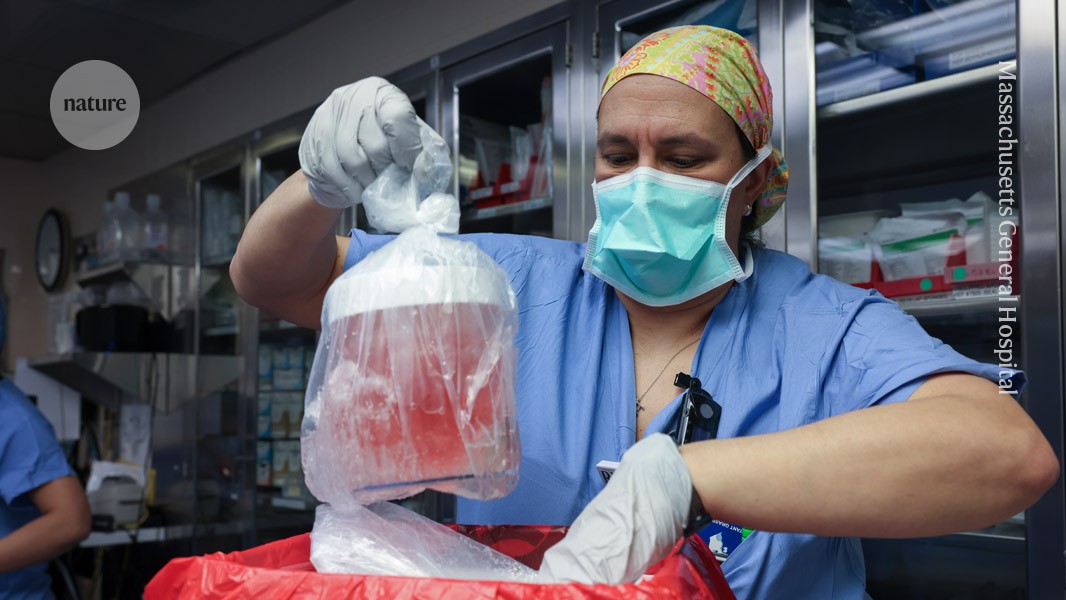odanny
Diamond Member
This is the next big barrier to cross in human health. Ladt week, the man who received the pig kidneys were harvested from a miniature pig with 69 genomic edits.
We are in the process of breeding replacement organs from animals, which likely will function better than anything mechanical, as chemcial processes demand something from a mammal.
The recipient of the pig kidney is a 62-year-old man with end-stage renal failure named Richard Slayman. He is recovering well after the surgery on 16 March, according to his transplant surgeon. The kidney was taken from a miniature pig carrying a record 69 genomic edits, which were aimed at preventing rejection of the donated organ and reducing the risk that a virus lurking in the organ could infect the recipient.
The case demonstrates that, at least in the short term, these organs are safe and function as expected, says Luhan Yang, chief executive of Qihan Biotech in Hangzhou, China, and one of the founders of the biotechnology firm that produced the pigs, eGenesis in Cambridge, Massachusetts. The company is in discussion with the US Food and Drug Administration (FDA) about planning clinical trials for pig kidney and paediatric heart transplants, as well as for the use of pig livers that would be connected to the recipient from outside the body, says Wenning Qin, a molecular biologist at eGenesis.

 www.nature.com
www.nature.com
They engineered pigs with specific genetic alterations through meticulous breeding, offering hope for overcoming this hurdle. In a groundbreaking study, they transplanted kidneys from these genetically modified pigs into two brain-dead human recipients, sustaining their bodies with ventilators throughout the experiment.
The transplanted kidneys started working immediately, making urine and giving doctors hope. During the 54-hour study, the kidneys worked better and better, with tests showing they were functioning well in both recipients. Creatinine levels showing kidney health dropped after the transplant, indicating the procedure was successful.
Biopsies conducted at regular intervals revealed no signs of rejection, instilling confidence in the viability of the transplanted organs. Throughout the study, the transplanted kidneys continued functioning robustly, surpassing expectations with their high urine output.
We are in the process of breeding replacement organs from animals, which likely will function better than anything mechanical, as chemcial processes demand something from a mammal.
The recipient of the pig kidney is a 62-year-old man with end-stage renal failure named Richard Slayman. He is recovering well after the surgery on 16 March, according to his transplant surgeon. The kidney was taken from a miniature pig carrying a record 69 genomic edits, which were aimed at preventing rejection of the donated organ and reducing the risk that a virus lurking in the organ could infect the recipient.
The case demonstrates that, at least in the short term, these organs are safe and function as expected, says Luhan Yang, chief executive of Qihan Biotech in Hangzhou, China, and one of the founders of the biotechnology firm that produced the pigs, eGenesis in Cambridge, Massachusetts. The company is in discussion with the US Food and Drug Administration (FDA) about planning clinical trials for pig kidney and paediatric heart transplants, as well as for the use of pig livers that would be connected to the recipient from outside the body, says Wenning Qin, a molecular biologist at eGenesis.

First pig kidney transplant in a person: what it means for the future
The early success of the operation has made researchers hopeful that clinical trials for xenotransplanted organs will start soon.
Exciting Scientific and Clinical Progress of Xenotransplantation in the Last 2 Years
These scientists, published in the New England Journal of Medicine in 2022, highlighted the critical shortage of organs available for transplantation and worked on genetically modified pig organs, recognizing them as a promising solution. However, they faced the daunting challenge of hyperacute rejection.They engineered pigs with specific genetic alterations through meticulous breeding, offering hope for overcoming this hurdle. In a groundbreaking study, they transplanted kidneys from these genetically modified pigs into two brain-dead human recipients, sustaining their bodies with ventilators throughout the experiment.
The transplanted kidneys started working immediately, making urine and giving doctors hope. During the 54-hour study, the kidneys worked better and better, with tests showing they were functioning well in both recipients. Creatinine levels showing kidney health dropped after the transplant, indicating the procedure was successful.
Biopsies conducted at regular intervals revealed no signs of rejection, instilling confidence in the viability of the transplanted organs. Throughout the study, the transplanted kidneys continued functioning robustly, surpassing expectations with their high urine output.
